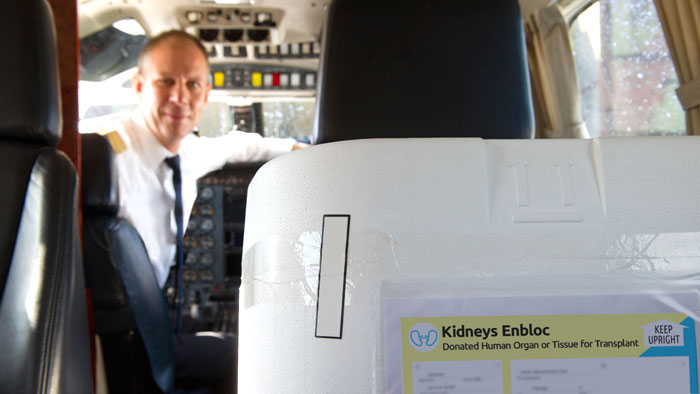Vote calls for a work group to consider whether organs transported via commercial flight could once again travel safely in a plane’s cabin
The U.S. House of Representatives has approved, as part of its 2023 Federal Aviation Administration (FAA) reauthorization bill, a provision aimed at enhancing efficiencies of the transportation of donor organs through the nation’s commercial aviation system.
Section 834 of H.R. 3934, the Securing Growth and Robust Leadership in American Aviation Act, requires the Secretary of the Department of Transportation (DOT), in consultation with the FAA Administrator, to convene a working group to develop best practices for the transportation of an organ in the cabin of an aircraft.
Action by the House, taken on July 20, 2023, promises to review and possibly reverse a practice established in the wake of the attacks of Sept. 11, 2001. Before then, organs – primarily kidneys – were transported within a commercial flight’s cabin, under supervision of the aircrew. Packaged organs were placed in or near the cockpit just before departure and quickly retrieved after landing. The attacks prompted significant changes to airport protocols, which no longer allowed transplant professionals without an airplane ticket to accompany an organ through security. As a result, organs currently travel in the cargo hold.
“I applaud the actions taken by the House. I offer my profound thanks to those working with us to make this change a reality, namely Rep. Bruce Westerman and Rep. Greg Stanton from the House Transportation and Infrastructure Committee, and their colleagues Rep. Tracey Mann, Rep. Dusty Johnson, and Rep. Beth Van Duyne,” said United Network for Organ Sharing (UNOS) CEO Dr. Maureen McBride. “This is the result of collaborative efforts on behalf of patients waiting for the gift of life, while also honoring generous donors and their families. There is more work to be done as we to ensure this legislation is enacted, but this is a critical step.”
While not a common occurrence, any logistical delays heighten the risk that an organ cannot be transplanted. The post September 11 relegation of organs to the cargo hold created challenges navigating cargo hours and cargo lock-out times – the cut-off time for receiving shipments before the scheduled departure of an aircraft. Not all airlines accept cargo, so options are limited for transporting organs by air, especially to areas served by smaller, regional airports.
”Any organ not ultimately transplanted represents a profound loss, both for the selfless donor’s family and the patient waiting,” said Dianne LaPointe Rudow, President of UNOS. “Our donation and transplant community is called to honor the gift of life, and that commitment includes not only publicly identifying the issue, but seeking substantive solutions to address it. We owe our patients nothing less.”
The provision included in the House version of the FAA reauthorization bill is the result of ongoing advocacy by UNOS, organ procurement organizations (OPOs) and other members of the nation’s organ donation and transplantation community. Since December of 2022, UNOS has engaged with the FAA leadership, the Transportation Security Administration (TSA), the Department of Transportation (DOT), and members of both the House and Senate to pursue this reform.
“The organ donation and transplant community rallied behind this cause, knowing that it represents major progress for our patients and selfless donors,” said Dr. Jerry McCauley, Immediate Past President of UNOS. “This change is also a cornerstone of the UNOS Action Agenda, a series of improvements we know will strengthen the U.S. donation and transplantation system.” To further reduce risk of delay, damage or loss in organ transport, UNOS is recommending changes in the next contract for the Organ Procurement and Transplantation Network that would require the use of physical trackers for unaccompanied donor organs recovered for transplant, and the establishment of a centralized organ tracking system.
The Senate Commerce Committee could take up the issue very soon in its reauthorization legislation. The Senate provision would require the FAA to establish regulations ensuring that donor organs transported via commercial flight can once again travel in the plane’s cabin, as opposed to traveling in cargo. “We look forward to supporting the passage of the provision in the Senate Commerce Committee and on the Senate floor,” said McBride. Sen. Maria Cantwell, Chair of the Senate Commerce Committee, Sen. Ron Wyden, Chair of the Senate Finance Committee, and Sen. Ted Cruz, Ranking Member of the Senate Commerce Committee, are supporters of the Senate provision.
Actions to move organs back to the airplane cabin and out of cargo were widely endorsed by the transplant community, including the American Association of Kidney Patients, American Foundation for Donation & Transplantation, American Society of Histocompatibility and Immunogenetics, American Society of Nephrology, American Society of Transplantation, American Society of Transplant Surgeons, Association of Organ Procurement Organizations, Donate Life America, Donate Life Virginia, Kidney Care Partners, Kidney Transplant Collaborative, National Kidney Foundation, Nationwide Organ Recovery Transport Alliance, North American Transplant Coordinators Organization, Organ Donation Advocacy Group, Renal Physicians Association, Transplant Recipients International Organization, Transplant Families, Transplant Unwrapped, and Waitlist Zero.
Congress will need to advance reauthorization legislation before the current FAA authorization expires on September 30, 2023.
Related
When minutes matter: Read about challenges in organ transportation.

